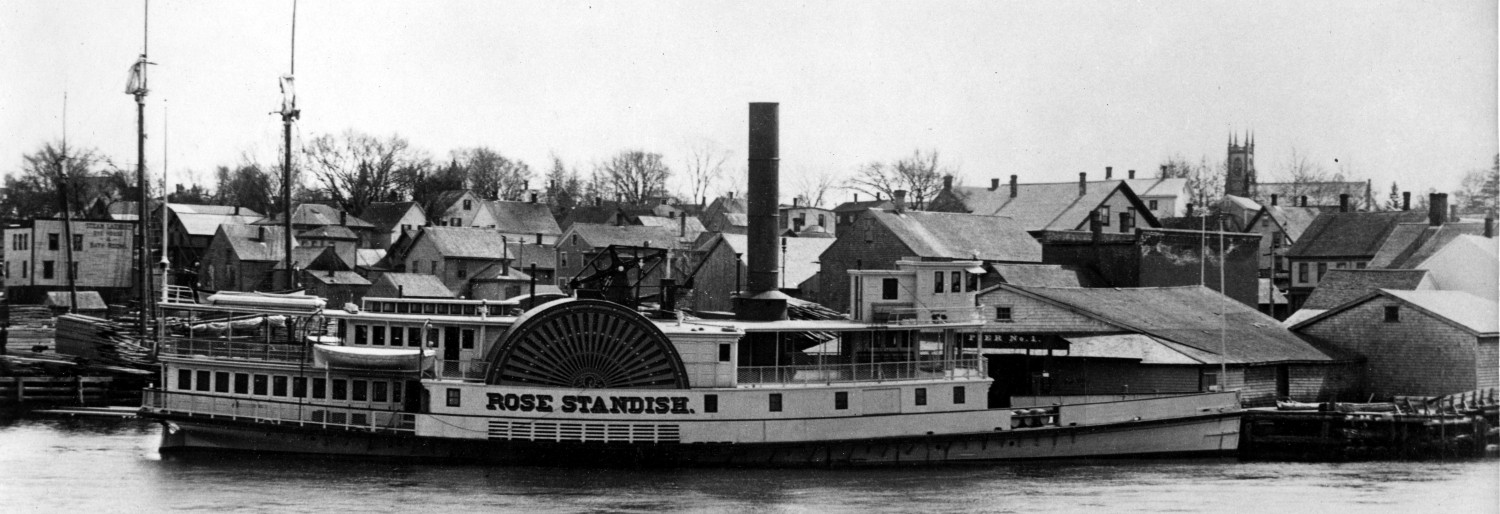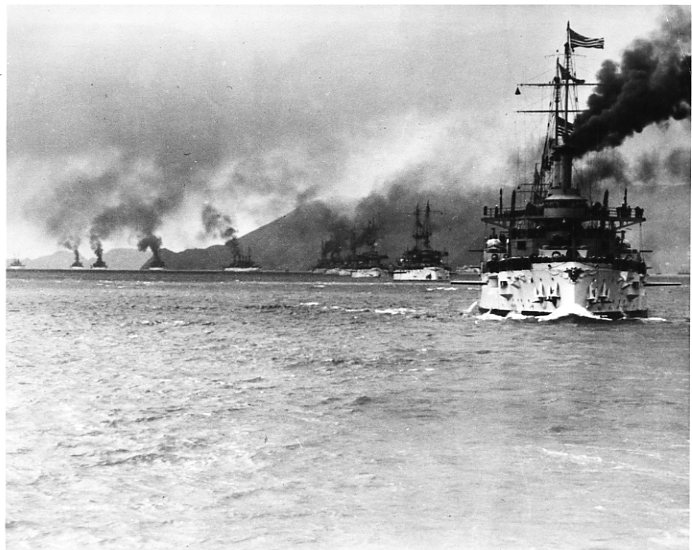
1908 was an important year on the world’s seas. America’s “Great White Fleet” of the country’s battleships was sent by Teddy Roosevelt to circumnavigate the globe and affirm America’s claim to be an international sea power. It began its journey in Hampton Roads, Virginia and stopped in dozens of ports around the world including Sydney, Australia where 221 American sailors deserted and chose to remain in Australia.
In 1908 the ball was dropped for the first time in Times Square to welcome the New Year, but female celebrants were not allowed to smoke while raising their celebratory glass of champagne. New York had just passed a law prohibiting women from smoking in public.
Robert Peary sailed out of New York Harbor on his expedition to the North Pole and while he claimed to have reached the pole in September of 1909, there is considerable evidence he missed the mark.
Going in the other direction 1908 saw a motor car race from New York City to Paris via Alaska and Siberia which was won by George Schuster in 88 days. In baseball the sacrifice fly was adopted, only to be repealed in 1935 and reinstituted in 1954. Cy Young pitched his second no hitter for the Boston Red Sox and, more significantly for Red Sox fans, the Yankees lost 100 games.
Panama City set the world’s record for rain- 2.47 inches in 3 minutes and the first major oil discovery occurred in the Middle East in Iran, the repercussions from which still roil the planet. Germany decided to build 4 new warships, angering the Brits and putting the world a step closer to the Great War. Henry Ford built his first Model T which sold for $825, a price which Ford managed to cut in half within a few years.
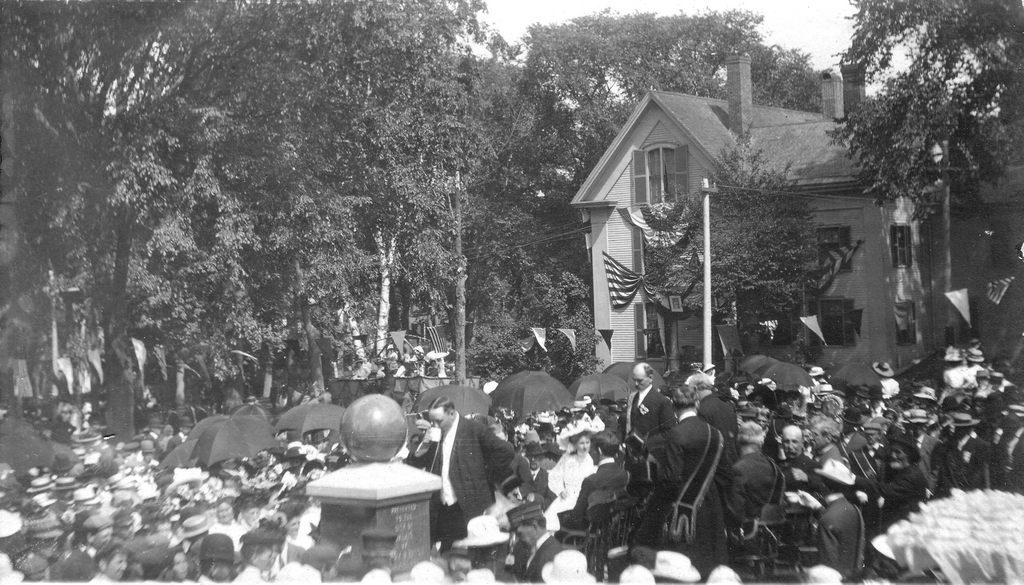
In 1908 Calais once again elected William Fowler as mayor. He is seen above in 1909 taking the first drink of water from the new water fountain in Memorial Park. Fowler was unquestionably the most popular Mayor to hold that office in the history of the city. Calais had a population of 6000 in 1908 and St. Stephen 3000. According to Charles Rolfe the Indian Agent, the Passamaquoddy Tribe census was 456, down from 463 the previous year. An epidemic of scarlet fever plagued Pleasant Point, closing the schools.
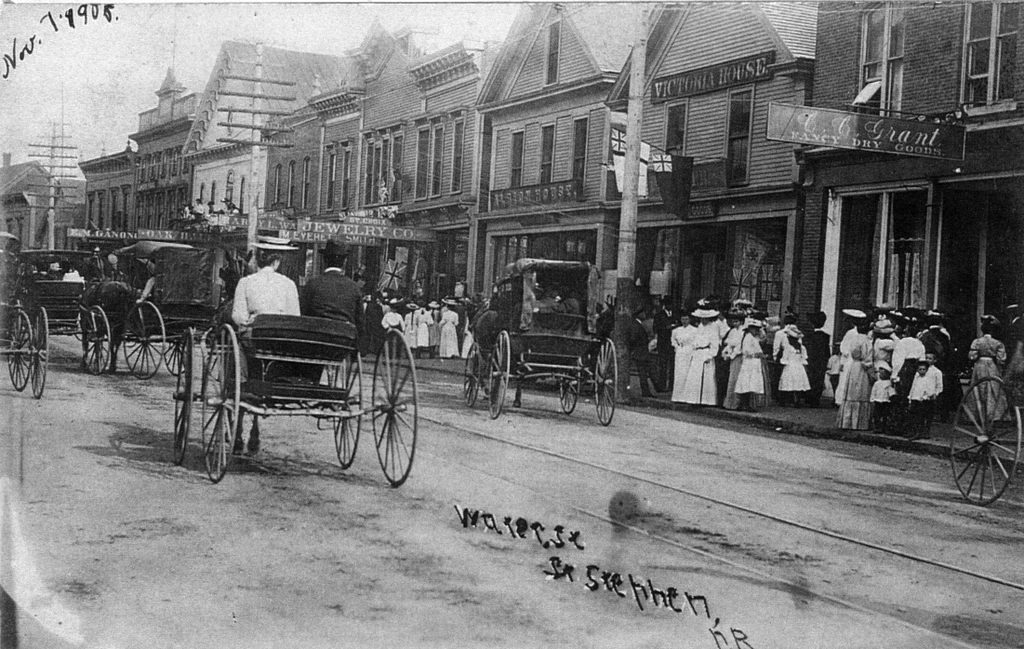
Although only half the size of Calais at the time, St. Stephen’s Water Street was booming and was a popular shopping destination for folks from both sides of the border.

Also booming was the Woodland Mill which had been open only two years but saw its first outbreak of labor unrest as the papermakers went on strike for better wages and working conditions. The strike lasted only three days and accomplished little but was a harbinger of the labor unrest which was to plague “the mill” over the decades. The mill manager in 1908, one J.M. Lavin, was from “away” and found himself in hostile territory not only because his employees thought him a Scrooge but because of the primitive conditions under which he was expected to live. He had foolishly brought with him to the wilds of Maine his new 1907 Reo Touring car which he advertised for sale in Bangor Daily News in 1908 for $850, probably because Woodland had no roads in 1908 suitable for a “motor” or “horseless carriage” as cars were sometimes called in those early days. Certainly, none of the papermakers were likely to help push his Reo out of the narrow lanes filled with mud holes and deep ruts which passed as roads in the Woodland of 1908.
Granite workers in both St. George NB and Red Beach went on extended strikes which shut down the polishing mills for long periods in 1908. The Red Beach strikers’ demands were at least partially met.
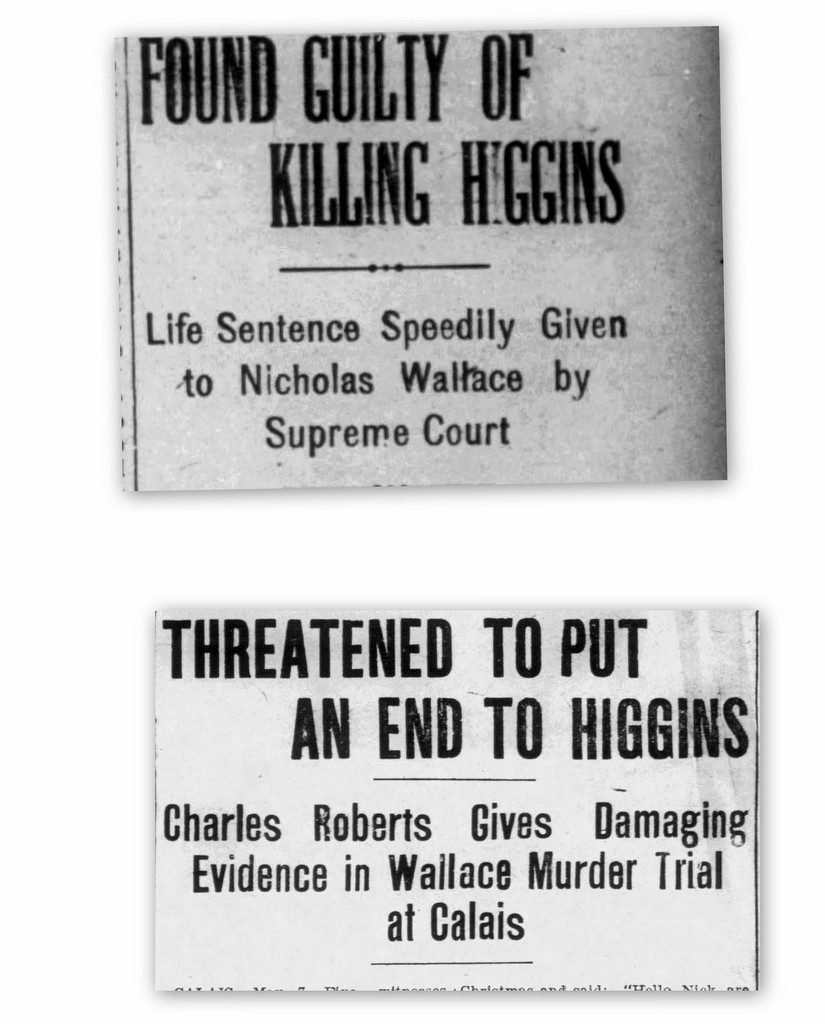
Most of the news locally in 1908 seemed to involve the seamier side of human nature or in the case of Nicholas Wallace of Baileyville, the outright violent. He was tried in Calais in 1908 for the murder of Andrew Higgins, the case being notable not on the facts but because it may have been one of the briefest murder trials in the State’s history. Wallace was brought before the Court on Wednesday and after two days of testimony which established motive and opportunity but no direct evidence of his guilt, he was packed off to Thomaston with a life sentence on Monday morning. The State relied primarily on a fur coat which belonged to the victim and which Wallace sold in Milltown N.B after the murder and statements made by the defendant which were incriminating but hardly confessions. The evidence also established that Wallace had stolen items of clothing from the deceased before the murder and Wallace testified the coat was one of those items. He never confessed and maintained his innocence throughout the trial.
Bangor Daily May 7, 1908
THREATENED TO PUT AN END TO HIGGINS
Charles Roberts Gives Damaging Evidence in Wallace Murder Trial at Calais
CALAIS, May 7.
Five witnesses were examined before the noon recess today in the trial of Nicholas Wallace for the alleged murder of Andrew Higgins at Baileyville before the supreme court. Mrs. Hattie Berry identified by means of initials and marks on the sleeve lining the fur coat owned by the victim and alleged to have been sold by Wallace to parties at Milltown, N. B. after Higgins death. Other witnesses described the finding of the body on January 22 and its condition as regards bruises and clothing. One witness testified that blood spots near the cabin were in plain sight while another stated that one might easily have overlooked them. This evidence was brought out by the counsel for the defense in an attempt to show that the blood was not on the ground when the premises were visited by John Hogan on the morning previous to that on which the body was found. Coroner C. E. Johnson of Princeton gave testimony as to the condition of the body when first seen by him and stated the finding of the jury at the inquest. Prof. Franklin C. Robinson of Bowdoin college testified that he did not find any blood upon the clothing taken from the respondent excepting traces of blood on the right sleeve of the coat where an attempt evidently had been made to wash it off. Upon being questioned Prof. Robinson said he could not tell whether or not the traces of blood found on the sleeve and upon the skirt of the coat were human blood. He said he found human blood on the two clubs and on the quilt which were found near Higgins’s cabin. He found Higgins’s stomach in normal condition. Testimony in regard to a threat alleged to have been made by Wallace against Higgins was given late this afternoon by Charles Roberts of Baileyville. Roberts testified that he met Wallace in Woodland just before Christmas and said: “Hello, Nick, are you back again to steal more of old Andrew Higgins clothes? The witness said Wallace asked: “Does that old man say I stole his clothes? When the witness answered “Yes, Wallace replied, “If he does not stop lying about me, I’ll put an end to him.” The witness further said that on Dec. 26th, Wallace showed him an old brown or black pocketbook containing $75. At the conclusion of his testimony, court adjourned until tomorrow.
DETAILS OF THE CRIME. The crime for which Nicholas Wallace is now being tried was committed during the night of January 16 last, the victim being Andrew Higgins, an inoffensive old man living alone in a shack on his farm, which is located about two miles from Woodland, in the town of Baileyville, on the Princeton Road. The weapons used were a bed slat four feet long and a gray birch club, 25 inches long and 1 3-4 inches in thickness. The skull of the murdered man was beaten to a jelly and his face badly disfigured. The last seen of Higgins was on the afternoon of January 22 and the finding of his body occurred on the morning of January 26. As Higgins had been in the habit of making short visits to town his disappearance did not occasion surprise or uneasiness on the part of his neighbors, but as Sunday passed and he did not return, three young men, Thomas Sprague, John Munson and Benjamin King, determined to have a look about the Higgins farm. Reaching the shack, they found the place unlocked and a short distance from the door came across a pool of blood, close to which were lying the birch club and bed slat, both bearing bloodstains. Following the trail of blood, which led to a clump of bushes about 20 feet from the camp, where the body of Higgins was found behind a spruce tree, partially covered by boughs. The body was not disturbed but the selectmen of Baileyville were notified as was also Coroner Johnson of Princeton. An inquest was held on the morning of Thursday, Jan. 23, the jury returning a verdict of murder against parties unknown. Deputy Sheriff Woodman was notified of the affair by Selectman Ryan of Woodland and immediately began a search for the murderer. Frank Williams, as he was called, but known as Nicholas Wallace, was at once suspected of the crime and a search was made for him. On the morning following the discovery of the mutilated remains of Mr. Higgins Wallace was taken into custody at Topsfield by Selectman Otis H. Taylor and another resident of that place and brought to Woodland where he was given a hearing before Trial Justice H. J. Dudley of Calais. He underwent the ordeal without evincing the slightest uneasiness or interest in the proceedings and was held without bail for trial at the April term of the Supreme Judicial Court. At the time of his arrest Wallace wore a full beard which gave his face a rather sinister expression but after being placed in Machias jail he shaved off his beard with the exception of his mustache, his general appearance being greatly improved thereby. Wallace consistently maintained silence when the case was referred to but on all other subjects was willing to talk and did not appear in the least worried over the predicament in which he found himself. After the hearing at Woodland the body of Andrew Higgins was removed to the undertaking rooms of John Gillis Co. in Calais, where an autopsy was performed, and the body was then turned over to relatives for interment at Upper Mills.
Bangor Daily News May 8, 1908
EVIDENCE ALL IN
The Wallace Respondent Was the Chief Witness Friday
Saturday Will be Devoted to the Arguments
CALAIS, Me., May 8
All the evidence in the trial of Nicholas Wallace, charged with the murder of Andrew Higgins at Baileyville in January last had been offered when the supreme court adjourned tonight. Tomorrow’s session of the court will be devoted to the arguments, and it is expected that the case will be given to the jury in the afternoon.
Wallace, the respondent, was the chief witness this afternoon, the defense occupying less than three hours in presenting its entire case. Wallace admitted that he was at the Higgins camp on the evening of Sunday Jan. 19, but he denied any knowledge of the murder. He also admitted some of the statements he is alleged to have made to deputy sheriff Stillman E. Woodman and constable John E. Black, while in their custody, and he admitted also that he stole a fur coat and some spectacles and shoes from the Higgins camp, as testified by these officers, but he declared that these thefts were committed on Dec. 28, 1907, instead of Jan. 19, 1908, the night following the disappearance of Higgins, whose body was found on Jan 22. The state had produced witnesses who testified that they had seen the fur coat in the possession of Andrew Higgins on Jan. 5, 6 and 10. An attempt by the state to introduce an alleged jail record of Wallace in Maine and Massachusetts was excluded.
The concluding witnesses were Deputy Sheriff Stillman E. Woodman of this city. Constable John E. Black of Baileyville, and Selectman Otis H. Taylor of Topsfield, who took Wallace into custody. They testified that damaging admissions were made “by the accused while in their care. “Woodman and Black stated that Wallace ‘admitted taking the fur coat from the Higgins camp the Sunday night following the victim’s disappearance and that he said, If I had not taken the damn coat, they wouldn’t have any evidence against me. They testified that Wallace admitted to them after the preliminary hearing that the evidence was pretty strong, and he did not care whether he was convicted or not and added “If sent to state prison I will know where I am going to sleep at night which is a sight more than I do now.” Selectman Taylor testified that the prisoner made similar remarks to him at Topsfield.
Bangor Daily May 11:
Life Sentence Speedily Given to Nicholas Wallace by Supreme Court
CALAIS, Me., May 10.
After one of the briefest murder trials in the history of Maine courts, Nicholas Wallace, who was arraigned in the supreme court Wednesday, was convicted Saturday of the murder of Andrew Higgins, a 70-year-old Baileyville farmer, and was promptly sentenced to life imprisonment in the state prison at Thomaston. The jury retired at 3.10-and 85 minutes later reported the verdict. Sentence was imposed within five minutes. Wallace heard the verdict without outward emotion, and after his attorney had conferred with him, and had announced to the court that no further contest would be made, he listened to the sentence. The selection of the jury in 25 minutes was the first indication of the brevity of the trial. The arguments were made at the forenoon session of the court Saturday. Atty-Gen. Hannibal E. Hamlin summing up the evidence for the state, and Atty. R. J. McGarrigle of this city making the plea for the respondent. Chief Justice Emery charged the jury when court was reconvened in the afternoon. The murder of Higgins, who, since the death of his wife, several years ago had lived alone, except for the occasional presence of Wallace, in a cabin on the edge of his farm, was most brutal. His body was found Jan. 22, partly concealed beneath a pile of brush near the cabin. The bead was battered by blows from a club. The finding of two blood-stained clubs near the body seemed to indicate that he had given battle to his assailant. The motive of the crime was believed to be robbery. Two days after the discovery of the body Wallace was arrested. His arrest was due principally to the knowledge gained by the officers that he had been ordered away from the cabin repeatedly and that a fur coat belonging to the dead man and missing from his camp had been sold by Wallace at Milltown, N. B.
Up the line in Princeton, a man named James A. Deane, 30 years of age, made the news in Bingham Maine where he had gone to work in a lumber camp and fallen in love with a local girl. Deane murdered the girl and, according to the news accounts “then committed suicide by cutting his throat. It is believed that Deane’s act was prompted by jealousy.” In Eastport a similar incident occurred when George Mitchell, spurned by his sweetheart Georgie Pratt, fatally shot her and then turned the revolver on himself. The headline in the Fall River Evening news reads “KILLS SWEETHEART AND SELF. TRAGEDY IN EASTPORT ME PROBABLY BROUGHT ABOUT BY JEALOUSY”
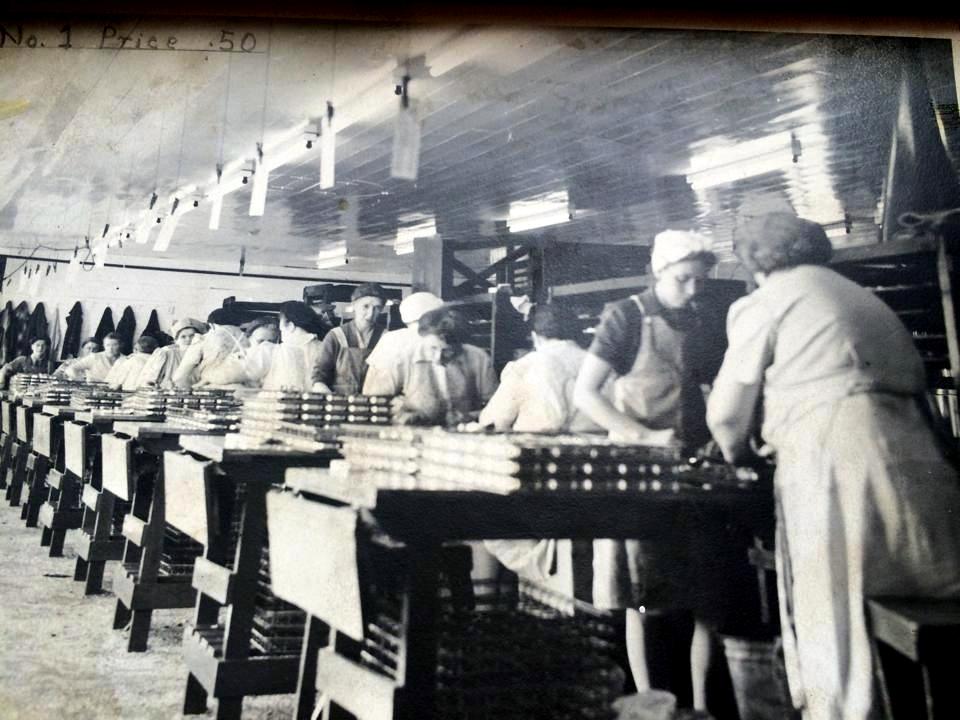
In other Eastport news the Feds swept into town in November with subpoenas for a dozen Eastport men to appear before a grand jury in Portland which was investigating violations of the Sherman anti-trust laws. Newspaper articles reported “All the prominent packers of sardines are included.” These “Prominent Packers” were accustomed to federal investigations given their decades long violations of the child labor laws. An appearance before the grand jury was more an irritant than a serious problem to the sardine kings.
News from across the bay was reported in the Kenosha Wisconsin News “The home of Henry Larrabee at South Lubec Me. is said to be the most eastern dwelling house in the United States. It is situated on the northeasterly side of Quoddy Head” and Perry made the news nationally as it did nearly every year for being halfway between the equator and the North pole.
There was little crime or other news in Calais in 1908 unless we count the embarrassing situation of Reverend McCully of the Congregational Church and the Premier’s daughter. Don’t be shocked, Reverend McCully was truly a most upstanding man and was simply duped when he performed an act of kindness in marrying a young couple who appeared on his doorstep at the end of June 1908. He could not have known the marriage would create an international incident and be declared illegal by the bride’s parents and others. The incident says a good deal about class distinctions and the rights of women in 1908, even those who were of age.
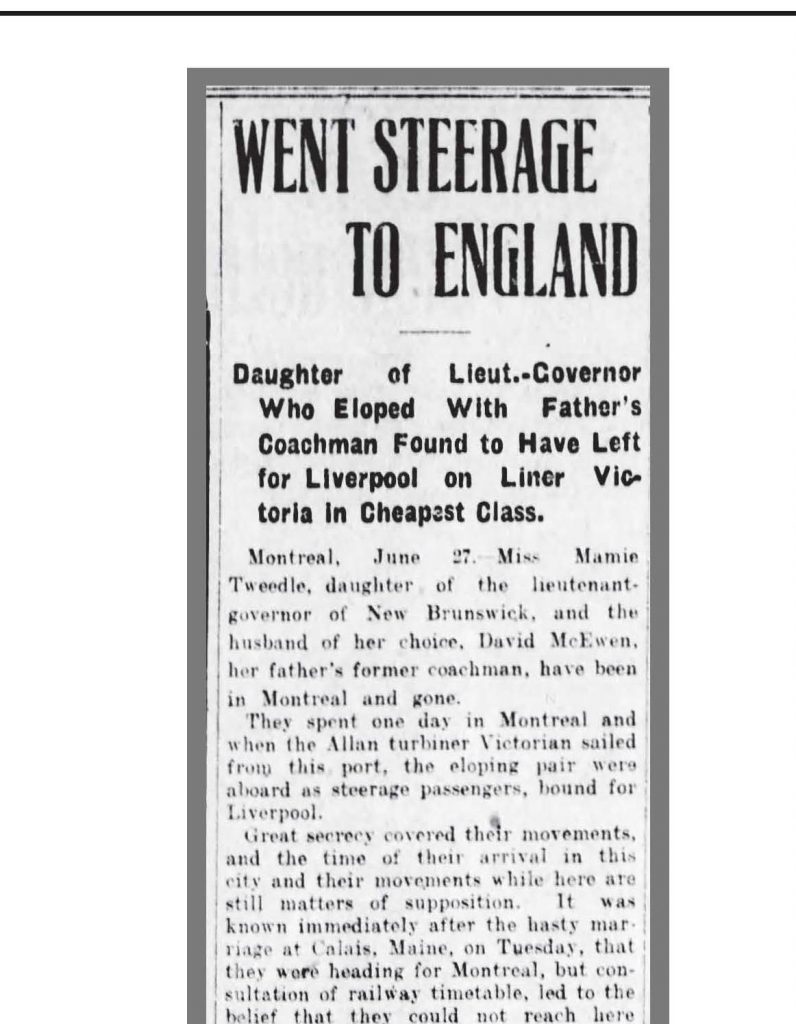
Vancouver Daily World June 17, 1908:
WENT STEERAGE TO ENGLAND
Daughter of Lieut-Governor Who Eloped With Father’s Coachman Found to Have Left for Liverpool on Liner Victoria In Cheapest Class.
Montreal, June 27.
Miss Mamie Tweedle, daughter of the lieutenant – governor of New Brunswick, and the husband of her choice, David McEwen, her father’s former coach man, have been in Montreal and gone. They spent one day in Montreal and when the Allan Turbiner Victorian sailed from this port, the eloping pair were aboard as steerage passengers, bound for Liverpool.
Great secrecy covered their movements, and the time of their arrival in this city and their movements while here are still matters of supposition. It was known immediately after the hasty marriage at Calais, Maine, on Tuesday, that they were heading for Montreal, but consultation of railway timetable, led to the belief that they could not reach her before earlier than yesterday afternoon. Shortly after noon, however, they turned up at the Canadian Pacific Railway ticket office on St. James Street and there purchased steerage passage tickets by the Victorian, for Liverpool. It is certain that they did not register at any of the city hotels during their stay.
When in the ticket office in St. James Street, Mr. McEwen and his young wife appeared highly nervous. They were nicely though not extravagantly dressed, she in a white blouse and blue traveling skirt, and he in a well-fitting brown suit. She wore a handsome gold chain and locket. It was, therefore, something of a shock to the ticket agent when this well-dressed man demanded steerage tickets, and he immediately jumped to the conclusion that there was something in the wind. The agent did not at the time, however, know of the elopement. Steerage tickets for David McEwen and Mrs. David McEwen were accordingly made out. “M – e – K – w – e – n.” spelled the applicant sharply, and then he counted out the roll of bills- $55 for the pair. Of money he seemed to have no lack. He then enquired as to the time of the vessel’s sailing, and on being told that they might go aboard any time after seven in the evening, the pair went away. McEwen is described as being a man of twenty- six or twenty – eight years of age, about the average height, but heavily built. He is dark complected, with a small black mustache, of fairly good features, but rather coarse in appearance. He had a decidedly “old country” air about him. Miss Tweedle, or rather Mrs. McEwen, is said to be somewhat shorter, and slight in build. She is fair complexioned, fair-haired, and rather pretty, with an air of culture and refinement, totally lacking in the man with whom she has cast in her lot. The ticket agent tells of having made up the usual bundle of luggage labels, slipping them into an envelope, and handing them across the desk. McEwen took them in his hand and looked at them with an air of indecision. “You’ll find plenty there,” said the agent, and McEwen then put the envelope in his pocket, “I guess they have not a very large amount of luggage to label,” commented the C. P. R. man, in telling of the affair.
Legal authorities are of the opinion that the ceremony, which took place at Calais, Maine, was under the circumstances, illegal, and that the man McEwen may be arrested on a charge of abduction. This in spite of the fact that the woman in the case is upward of twenty – one.
The couple had first gone to St Stephen and stayed at the residence of Mr. and Mrs. James Stevens described by the New York Times as “intimate friends” of Miss Tweedle’s mother and father. They crossed the bridge and called at the residence of Reverend McCully, minister of the Congregational Church in Calais. After giving the reverend satisfactory assurances and the groom claiming his occupation as a coachman and hers a housemaid McCully married them. According to the Times Miss Tweedle then returned to the Steven’s residence without her new husband and spent the night, only informing Mrs. Steven’s of the marriage the next day. They immediately contacted the Premier whose wife was “prostate by the intelligence and the Premier deeply grieved.”
The Montreal Star on the same day added the following details:
The Hon Mr. and Mrs. Tweedle had left their home In Fredericton to go to the St. John to attend the wedding yesterday of the daughter of the Hon F.L. Barker Chief Justice of New Brunswick. Shortly after they had left the church and had returned to their hotel, they were informed by long-distance telephone of the marriage of their daughter Mary K Tweedle twenty-two years of age to David McEwan a Scotch man and for the past year was the Hon Mr. Tweedle’s coachman. McEwan left his position about ten days ago and it is understood that he and his former employer’s daughter had been in communication continually and that all arrangements were agreed upon some time ago for the elopement and marriage. It is said that when the couple arrive in Montreal they will sail directly for the Old Country.
HAD LONG BEEN INTIMATE
During the last session of the Legislature when His Honor’s family were living at the Queen Hotel Fredericton the intimacy of the coachman with the young woman was the subject of conversation for many. On the grounds that she was ill Miss Tweedle was out driving about all the time in fine weather and McEwan was the one selected to do the driving. They used to drive comfortable buggies and to the casual passersby they always seemed to be thoroughly enjoying themselves. Miss Tweedle frequently had a box of chocolate or some sweet of some kind and she used to enjoy these with McEwan. McEwan is a Scotchman through and through and it is recalled that one evening when he met some militia officers at Fredericton two of them said something of an uncomplimentary nature about a Highland regiment of which McEwan was formerly a member. As quick as a flash McEwan floored one of them and when the other man spoke, he went down also.
We don’t know the fate of the young lady and her coachman for once the couple made it to Scotland the newspapers seem to have lost interest.
We did find a couple of Calais items of interest in Advertiser in 1908 and once again jealousy reared its ugly head although not with the dire consequences of the incidents from Princeton and Eastport.
On August 19th, 1908, the Calais Advertiser reported as follows:
“A lively and interesting scrap took place on Main Street the other evening when two of our young and beautiful society ladies indulged in a Marquis of Queensbury set to. Jealousy, that green eyed monster was the cause. The scrap started when on meeting each other, the Ward 1 lady poked her umbrella through the other young lady’s marcel wave and yanked her own and store hair all out of shape. It was too bad, after spending an hour and a half prinking up her hair so cute, to have it swatted out of shape. However, the hairless young lady got even; drawing off, she took the other a fearful wallop with the flat of her hand right across the mug. This was too much for the Ward 1 girl, she gave a whoop, danced around as mad as a wet hen. “Blast her,” said the victor as she walked away, “I’ll paste the face off her.”
If either of the young ladies required liquid courage for their next bout, they would not have been able to acquire it from Judson Bullock, a local bootlegger. Bullock had just appeared before Mayor and Municipal Judge Fowler after City Marshall Crossman found him in possession of liquor on the railroad tracks. Crossman vigorously protested his innocence and pleaded not guilty to the charge, demanding a trial. Fowler was having none of this, refused to allow Bullock to plead not guilty and summarily found him guilty without the extravagance of a trial which Fowler clearly believed to be simply an attempt to delay justice. When Bullock said he wanted to appeal Fowler had him remanded to the county jail. Apparently only murderers were allowed trials, albeit short ones, in Calais in 1908.
The local town getting the most national press in 1908 was Cooper where a fellow named John Lowe claimed that a bottle of Chamberlain’s Stomach and Liver Tablets cured him of “bad stomach trouble.” An ad swearing to the efficacy of the tablets appeared hundreds, perhaps thousands of times in national papers in 1908. The purveyors of patent medicines often used people from small, remote communities to promote their products and we presume with their consent. John Lowe was born in 1862 and died in 1917. He’s buried in the Cooper Cemetery on the Alexander Road and if the ad is to be believed he didn’t die of stomach problems.
The Calais Advertiser reported on June 17, 1908 that City Marshall Crossman would be strictly enforcing the City’s bathing ordinance which read:
No person shall swim or bathe in any waters surrounding the city, so as to be exposed to the view of passengers or other persons in any street, lane, alley or house in the City unless wearing a proper bathing suit.
We question whether any waters actually “surrounded the city” but suspect Judge Fowler would have taken a different view.
In a sign of the times the Advertiser reported in August 1908 that a cow grazing along the streetcar tracks took fright and ran into a team of horses driven by William Kennedy. The “frantic” horses bolted, throwing Kennedy to the ground where he was run over by the wagon and “every rib on the right side of his body broken.” Kennedy was in critical condition. Such accidents were not uncommon in 1908 and the situation was about to worsen considerably as backfiring automobiles were being introduced into the transportation mix. Clanging streetcars, honking and backfiring cars, teams of horses and cows grazing along the roads and streetcar tracks-what could possibly go wrong?
Finally, we want to end on a positive note. The St Croix Courier reported as follows:
A Troubled Conscience
Ganong Brothers were much surprised to receive in their mail one day last week the following letter:
Dear Sirs: Please find enclosed $5.00 which please place to the credit of the candy department. It amounts to the amount of peculations of confectionery from the store as long as twenty-four or twenty-five years.
Signed: Conscience
The money was enclosed but there is nothing whereby the conscience stricken one could be identified. The letter was mailed on the C.P.R. train between McAdam and Woodstock.
